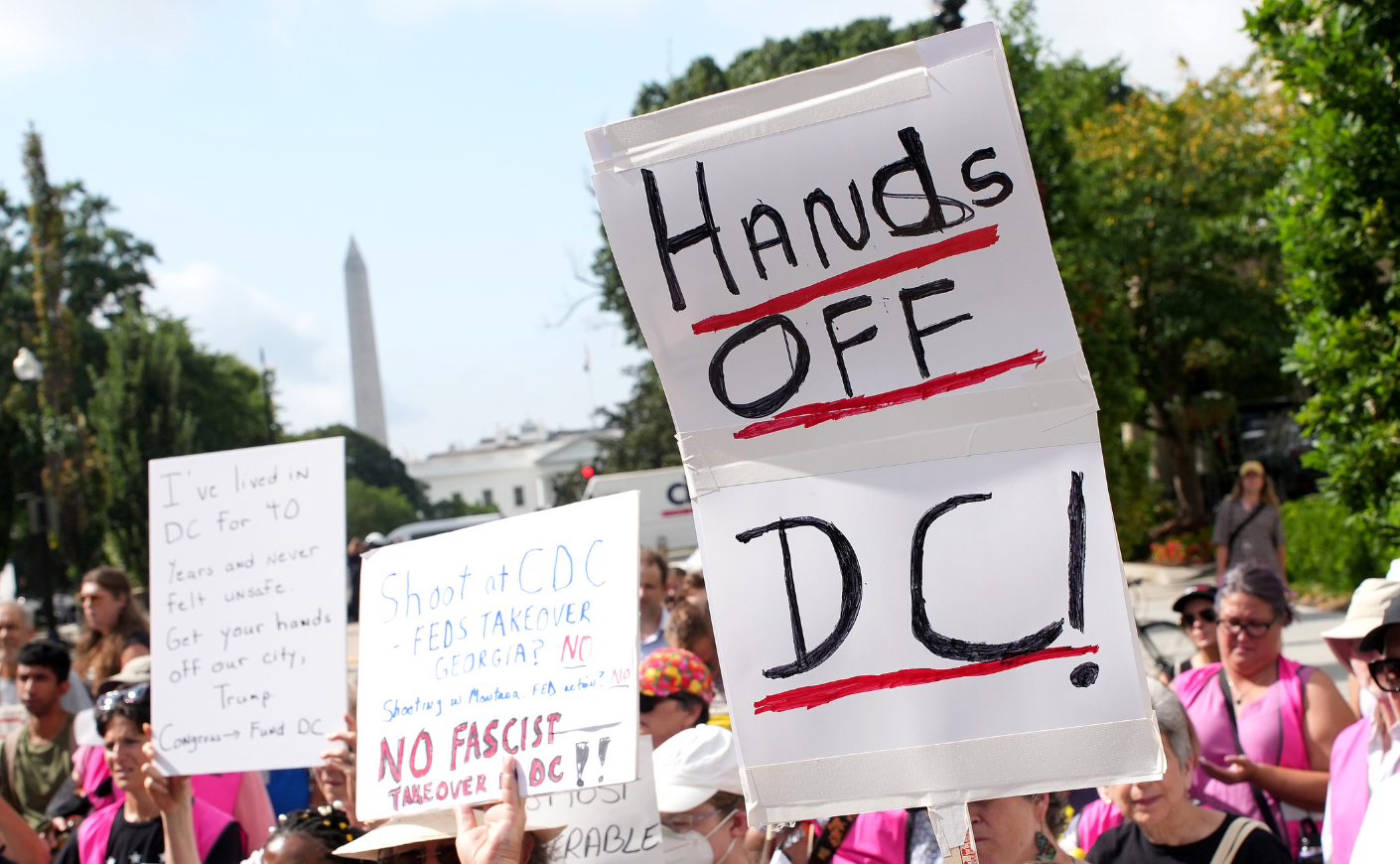President Trump is moving to expand presidential authority over Washington, D.C.’s local government — a step that's already stirring controversy. On Monday, he declared a public safety emergency and announced he would temporarily take charge of the city’s police department.
“This is liberation day in D.C. We're gonna take our capital back,” Trump told reporters at a White House press conference. “Our capital city has been overtaken by violent gangs and bloodthirsty criminals, roving mobs of wild youth, drugged-out maniacs and homeless people. And we're not going to let it happen anymore.”
Here’s a closer look at the legal authority he’s invoking, what the crime data actually shows, and how local leaders are reacting.
Can Trump really take over D.C.?
Under D.C.’s Home Rule Act of 1973, the president can take control of the local police department if he determines that “special conditions of an emergency nature” exist — a power that had never been used until Trump’s announcement on Monday. The authority lasts for only 30 days unless Congress approves an extension, and the president must explain his rationale in writing within 48 hours.
As part of the move, Attorney General Pam Bondi has been appointed to oversee the federalized Washington Metropolitan Police Department. The plan also includes deploying about 800 National Guard troops to the city and reassigning dozens of federal agents — among them, up to 120 FBI agents for nighttime patrols.
D.C’s police union, which represents more than 3,000 officers, backed the takeover, calling it necessary to address “violent crime surges, historic officer shortages, and eroded morale.” Still, the union stressed it should be a temporary step, with the ultimate goal of restoring a fully staffed and supported local force.
What about other cities?
The president has said he plans to extend the policy to other Democratic-led cities, describing them as “bad, very bad,” without giving specific reasons why. In addition to Washington, he named New York City, Baltimore, Oakland, Los Angeles, and Chicago as places where he wants to place police departments under federal control. Los Angeles is already in his crosshairs: earlier this summer, he sent thousands of National Guard members there over the objections of state and local officials.
“They’re so far gone,” Trump said of those cities. “This will go further. We’re starting very strongly with D.C.”
Is Washington, D.C., as unsafe as Trump says?
The numbers tell a different story about crime in the District of Columbia. Data from Washington’s Metropolitan Police Department show violent crime has fallen sharply since its post-pandemic peak in 2023. Compared to this time last year, violent crime is down 26 percent, with big drops in key categories like homicides, robberies, burglaries, and a 50 percent decline in sex abuse cases.
A recent Department of Justice report paints an even broader picture: Violent crime is down 35 percent since 2023, bringing the city’s rate to its lowest point in three decades and back in line with the pre-pandemic trend of steady declines. Overall crime in D.C. is down 7 percent so far this year, with burglary down 20 percent and motor vehicle theft holding steady.
Still, Washington’s murder rate remains relatively high. In 2024, the city recorded 25.5 murders and non-negligent manslaughters per 100,000 residents, according to a USA TODAY analysis of FBI Uniform Crime Reporting data — the fifth-highest among more than 30 U.S. cities with populations over half a million.
Trump, however, skips that nuance, instead pointing to recent incidents as proof the city is in crisis — including the assault of a former Department of Government Efficiency employee by a group of teens earlier this month. A police cruiser arrived mid-attack, and two suspects were arrested on unarmed carjacking charges.
How are local leaders responding?
At a press conference after Trump’s announcement, D.C. Mayor Muriel Bowser called the president’s decision “unsettling and unprecedented.”
While she acknowledged the city experienced a “terrible” spike in crime in 2023 — in line with a national trend — she pushed back on the idea that D.C. is in the middle of a crime wave. “We are not experiencing a crime spike,” she told MSNBC on Sunday. “The president is very aware of our efforts.”
Other local leaders voiced similar objections. D.C. Democratic Delegate Eleanor Holmes Norton criticized Trump’s sweeping crime crackdown as “an historic assault” on the city’s autonomy, and said it underscored her decades-long push for statehood.
“President Trump’s decision to federalize MPD and activate the D.C. National Guard to address crime is an historic assault on D.C. home rule, is a counterproductive, escalatory seizure of D.C.’s resources to use for purposes not supported by D.C. residents, and is more evidence of the urgent need to pass my D.C. statehood bill,” Norton said in a statement.
This pushback sets the stage for a likely showdown over how far the federal government can go in policing the nation’s capital — and whether the president’s unprecedented move will stand.









